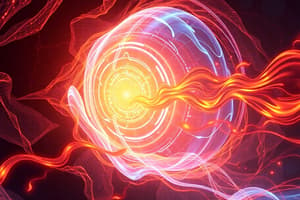Podcast
Questions and Answers
What is the branch of physics that deals with heat transfer processes and thermodynamic systems?
What is the branch of physics that deals with heat transfer processes and thermodynamic systems?
Thermal physics
How is temperature related to the kinetic energy of atoms and molecules within a substance?
How is temperature related to the kinetic energy of atoms and molecules within a substance?
Temperature varies based on the kinetic energy; warmer objects have faster velocities compared to cooler ones.
Name the three main methods of heat transfer discussed in thermal physics.
Name the three main methods of heat transfer discussed in thermal physics.
Conduction, convection, and radiation
What is the focus of thermodynamics in thermal physics?
What is the focus of thermodynamics in thermal physics?
How does understanding thermal physics benefit engineers?
How does understanding thermal physics benefit engineers?
What role does thermal physics play in medicine and biophysics?
What role does thermal physics play in medicine and biophysics?
Explain the difference between heat and temperature.
Explain the difference between heat and temperature.
How does the first law of thermodynamics explain the conservation of energy?
How does the first law of thermodynamics explain the conservation of energy?
Describe how the concept of entropy relates to the arrangement of molecules within a system.
Describe how the concept of entropy relates to the arrangement of molecules within a system.
Explain the role of enthalpy in thermal physics and how it relates to the energy contained within a substance.
Explain the role of enthalpy in thermal physics and how it relates to the energy contained within a substance.
How does thermal physics play a role in the process of cooking food on a stove?
How does thermal physics play a role in the process of cooking food on a stove?
Explain why the addition of ice cubes to warm soda water increases the overall entropy of the system.
Explain why the addition of ice cubes to warm soda water increases the overall entropy of the system.
Flashcards are hidden until you start studying
Study Notes
Thermal Physics Overview
Thermal physics is a branch of physics dealing with heat transfer processes and thermodynamic systems. It encompasses subjects like temperature, thermal conductivity, and energy flow. This field is crucial in understanding various natural phenomena and designing technological devices that interact efficiently with thermal systems.
Temperature and Heat Transfer
At the heart of thermal physics lies the concept of temperature, which measures the hotness or coldness of an object. Temperatures vary based on the kinetic energy of atoms and molecules within a substance; warmer objects have faster velocities compared to cooler ones. Heat transfer happens via conduction, convection, or radiation, affecting the distribution of temperatures across bodies and fluids.
Thermodynamics
Another key component of thermal physics is thermodynamics, which focuses on heat and energy conversion processes in closed systems. Laws governing thermodynamics include conservation of energy and entropy, both of which dictate the relationship between heat and internal energy changes.
Practical Implications
Understanding thermal physics allows engineers to design efficient heating and cooling systems, as well as refrigerators, air conditioners, and furnaces that effectively manage temperature. Additionally, knowledge in this field helps us comprehend biological mechanisms behind heat regulation in living organisms, contributing to medicine and biophysics.
In conclusion, thermal physics forms the foundation upon which many technological advancements rest. By studying the behavior of heat and energy, researchers develop innovative solutions to everyday problems involving temperature management and efficiency enhancement.
Studying That Suits You
Use AI to generate personalized quizzes and flashcards to suit your learning preferences.




